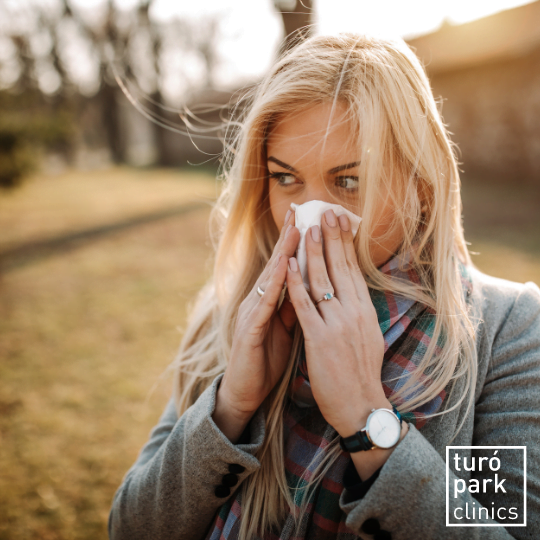Are you looking for a specialist in respiratory allergies in Barcelona?
Do you have a runny nose? Itchy eyes? These symptoms are indicative of respiratory allergies. This is not surprising when studies show that these allergies are affecting an increasing number of people in industrialized countries.
The English-speaking doctors working in our medical clinic are well aware of the restrictive consequences of allergic rhinitis and asthma. They will welcome you to provide treatment adapted to your ailments and your environment.
Make an appointment now!
Fast track your treatment
To book an appointment or speak with one of our friendly team, please get in touch using the options below.

What are the main forms of respiratory allergies?
As you may have noticed, respiratory allergies have been on the rise for the past two decades. This trend is due to air pollution and global warming, which, among other things, has resulted in a longer pollination process.
As a result, allergens (pollen, dust, mold, animal hair, etc.) multiply. Respiratory allergy is a chronic pathology. It occurs when your immune system has an inadequate response to the first contact between these foreign substances and your body.
If you are interested in scientific details and explanations, you should know that our bodies first produce antibodies called IgE when we first encounter an allergen. Then, these same defense proteins are responsible for the release of histamine, the scientific substance that causes allergic symptoms.
Allergic rhinitis
Allergic rhinitis is an inflammation of the inside of the nose caused by an allergen, such as pollen, dust, mould or flakes of skin from certain animals.
It's a very common condition, estimated to affect around 1 in every 5 people in the UK.
The symptoms are usually those typical of a cold:
- Runny nose
- Itchy eyes, mouth or skin
- Sneezing
- Stuffy nose due to blockage or congestion
- Fatigue (often reported due to poor quality sleep as a result of nasal obstruction)
Asthma
Allergic asthma is asthma caused by an allergic reaction. It’s also known as allergy-induced asthma. You may have allergic asthma if you have trouble breathing during allergy season.
More than 25 million people in the US have asthma, and allergic asthma is the most common type, affecting around 60% of people with asthma. Both allergic and non-allergic asthma have the same symptoms, such as shortness of breath and wheezing.
The cause of asthma isn’t known. However, for those with allergic asthma, the reason symptoms start is related to allergens. This is the main difference between allergic asthma and other types of asthma — allergens are inhaled and trigger asthma symptoms.
How to treat respiratory allergies?
When the first symptoms appear, do not hesitate to contact the ENT specialists at Turó Park Medical Clinic. They will first make a diagnosis to confirm the allergic pathology by carrying out various types of tests:
- Respiratory tests
- Prick tests
- Blood tests
The treatment of rhinitis aims to make the body insensitive to the allergen responsible for the allergy. Our English-speaking specialists opt for two therapeutic methodologies:
- Antihistamine treatment: administered orally, this medication is used to combat the effects of histamine.
- Corticosteroid treatment: prescribed by nasal route, this method is known to reduce the effects of allergy.
- Inhalation of a corticosteroid: to reduce inflammation of the bronchial tubes
- Prescription of Ventolin: this medicine is a bronchodilator that acts on the airways to improve oxygenation of the body
- Forget about aerosols which increase mucous membrane irritation
- Avoid sports and outdoor activities during pollen and pollution peaks
ENT problems are common.
Don't let them ruin your life!

How to prevent respiratory allergies?
Although it is complicated to control pollution or the consequences of global warming, the doctors at our medical center insist on the harmful effects of certain aggravating factors:
- Passive smoking
- Unventilated living spaces
- Stress
- Poor diet
- Obesity
Our English-speaking specialists

